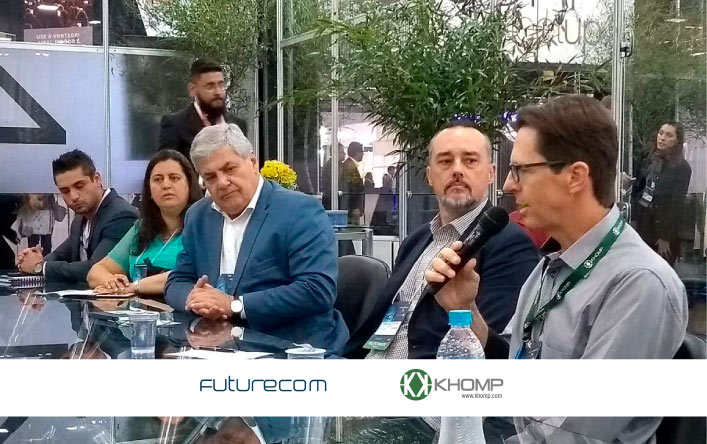What are the perspectives and needs of technology applied to Professional Tourism? To answer this question, the second day of Futurecom 2018 featured MeetUp: Innovation, Technology and Mobility transforming the Connected Customer Experience, which brought together industry representatives and technology experts such as Khomp CEO Giancarlo Macedo.
The participants of the panel included Fábio Costa, founder of Casa Mais 30; Jorge Della Via Júnior, Technology and Innovation Manager at Accor Hotels; Fernão Loureiro Tanaka, Phillips Business Travel Manager; and Eduardo Colturato, Tourism and Events Director of São Paulo Turismo. The meeting was moderated by Gabriela Otto, CEO at Gabriela Otto and columnist at Panrotas.
Big Data
The first issue raised at the table was the application of Big Data by Tourism companies. According to Fernão Loureiro, while there is a need to incorporate this model of operation and this is expected to occur, reading and capturing data to improve travelers’ experiences is not a reality yet. “The Tourism for Leisure segment, which involves travel operators and consolidators, is already addressing this more seriously. Unlike Corporate Tourism, which still deals with this matter from a distant position”, he analyzes.
For Giancarlo Macedo, one of the obstacles to this transformation is convenience. “Today, smartphones are the greatest generators of personal data. However, not every application to report on the user reality offers convenience. This is where the Internet of Things comes in and, consequently, the use of sensors”, he explains.
Eduardo Colturato also points out the lack of expertise in using user information as an obstacle to its application. “Big Data might be the tool with the least impact on the tourist at his/her destination,” he concludes.
Present and future technologies
Also included in the agenda was the use of virtual reality and augmented reality applied to different Tourism segments.
“We recently did a job with Agaxtur which contemplated the use of VR glasses at the travel agencies. The idea was to give a ‘peek’ of what the desired destination looked like to help convert sales,” says Fábio Costa.
While it was considered a positive experience, the participants in the discussion did not see a massive use for it in the long run, but they did understand it as a future trend.
On the other hand, artificial intelligence applications, especially the chatbots, are already being largely explored. “It is an essential tool for Corporate Tourism, considering its 24-hour availability for the user,” Loureiro says.
However, there still are application gaps. “Two years ago, room telephones accounted for the second largest source of revenue for hotels; today, they are hardly ever used. Their main purpose now is for guests to make questions about hotel logistics, such as breakfast hours and available services. So why not remove the telephones and prepare chatbots to answer to these questions?”, asks Della Via Júnior.
Final considerations
Regardless of the speed of adoption, all panelists agreed that the incorporation of such technologies into the tourism sector is a one-way street. The question is how to make them feasible, technically and financially speaking, and how to define their use policies. “When we get to the point where we obtain information exactly when we need it, then this will be our ideal scenario,” concludes Giancarlo Macedo.
